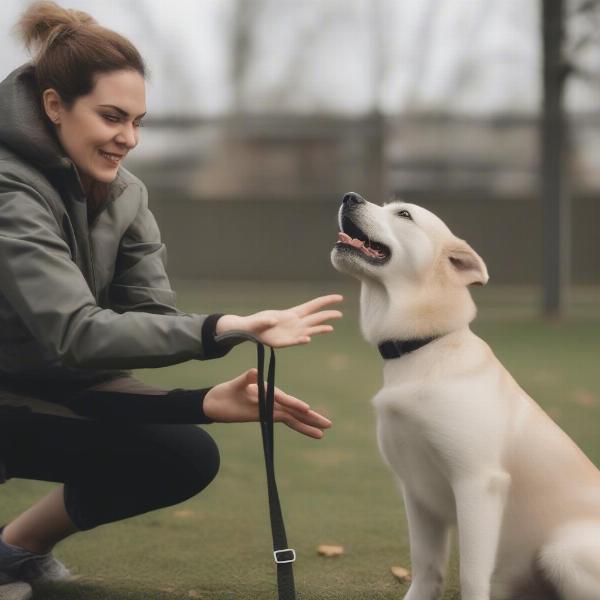The term “dog slave” is often used playfully, but it reflects a genuine dedication to our canine companions. While it might conjure images of someone catering to a pampered pooch’s every whim, the reality is more nuanced. This article will explore the “dog slave” phenomenon, examining the motivations, responsibilities, and potential pitfalls of this devoted approach to dog ownership.
Many “dog slaves” find immense joy in prioritizing their dog’s well-being. This often involves significant time, effort, and financial investment. From meticulously preparing balanced meals to diligently attending training sessions, “dog slaves” are committed to providing the best possible care for their furry friends. This dedication can stem from a deep love for dogs, a desire for companionship, or even a need to nurture another living being.
Is Being a “Dog Slave” Healthy? Balancing Devotion with Boundaries
While dedicating oneself to a dog’s happiness is admirable, it’s crucial to maintain healthy boundaries. An excessive focus on the dog’s needs can sometimes lead to neglecting one’s own well-being, or even inadvertently reinforcing negative behaviors in the dog. Finding the right balance between devotion and boundaries is key to a fulfilling and mutually beneficial relationship.
Recognizing the Signs of an Unbalanced Relationship
How can you tell if you’ve crossed the line from devoted dog owner to overly indulgent “dog slave”? Some signs include prioritizing the dog’s needs over your own to an unhealthy degree, allowing the dog to dictate your schedule and activities, or feeling anxious about leaving your dog alone.
The Rewards and Responsibilities of Dedicated Dog Ownership
The “dog slave” mentality, when approached responsibly, can lead to an incredibly strong bond between dog and owner. The unwavering love and companionship a dog provides are often cited as the most rewarding aspects of this lifestyle. aldeburgh beach dogs Dogs offer unconditional love, reduce stress, and encourage a more active lifestyle. However, responsible “dog slaves” also understand the significant responsibilities involved. These include providing proper nutrition, regular exercise, consistent training, and necessary veterinary care.
Understanding Your Dog’s Needs
Every dog is an individual with unique needs and preferences. Understanding these nuances is crucial to providing effective care. This involves learning to interpret your dog’s body language, recognizing their triggers and anxieties, and adapting your approach to best suit their personality.
From “Dog Slave” to Balanced Partner: Tips for Healthy Coexistence
Transitioning from an overly indulgent “dog slave” to a balanced partner involves setting clear boundaries, establishing consistent routines, and prioritizing both your own well-being and your dog’s. This includes scheduling dedicated time for your own activities, ensuring your dog gets enough independent playtime, and seeking professional guidance from a certified dog trainer or behaviorist if needed.  A dog and owner participating in a training session.
A dog and owner participating in a training session.
Conclusion
The “dog slave” label, while often used lightheartedly, highlights the profound dedication many people have for their canine companions. While this devotion can be a beautiful thing, it’s essential to maintain a healthy balance between catering to your dog’s needs and preserving your own well-being. By understanding the responsibilities and potential pitfalls of this dedicated approach, you can cultivate a fulfilling and harmonious relationship with your furry friend. why are black people afraid of dogs Remember, the best “dog slaves” are those who prioritize both their dog’s happiness and their own, creating a partnership built on mutual respect and understanding.
FAQ
-
What does “dog slave” mean? It refers to someone who dedicates a significant amount of time, effort, and resources to caring for their dog, often prioritizing the dog’s needs above their own.
-
Is being a “dog slave” bad? Not necessarily. Devotion is admirable, but it’s important to maintain healthy boundaries to avoid neglecting your own needs or inadvertently reinforcing negative behaviors in your dog.
-
How can I be a responsible “dog slave”? Focus on providing your dog with proper nutrition, exercise, training, and veterinary care, while also setting boundaries and prioritizing your own well-being.
-
What are the signs of an unbalanced relationship with my dog? Prioritizing your dog’s needs to an unhealthy degree, letting your dog dictate your schedule, and experiencing anxiety when leaving your dog alone are potential signs.
-
How can I find a balance between being devoted and setting boundaries? Establish consistent routines, schedule time for your own activities, ensure your dog gets independent playtime, and consider professional guidance if needed.
-
What are the benefits of being a dedicated dog owner? The strong bond, unconditional love, stress reduction, and encouragement of a more active lifestyle are often cited as major benefits.
-
How can I understand my dog’s individual needs? Learn to interpret their body language, recognize their triggers, and adapt your approach to their personality.
ILM Dog is your trusted international resource for all things dog-related. We offer expert advice on dog breeds, health, training, nutrition, grooming, and much more. Whether you’re a seasoned dog owner or just starting your journey, ILM Dog provides practical, reliable information to help you navigate the joys and challenges of dog ownership. Contact us today for personalized guidance! Email: [email protected], Phone: +44 20-3965-8624. We’re here to support you and your furry friend every step of the way.